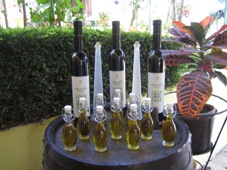to enlarge


or choose the place
from the menu below
 Rome |
 Byzantium |
 Venice |
 Vienna |
 Brioni |
 Smrikve |
 |
 |
_small.jpg) The first thing Mate planted was the vineyards and a few years later all the countryside around Smrikve was
as beautiful as it is today. Mate was an agricultural entrepreneur and his wife and children helped him to take care of both
the animals and the land.
The first thing Mate planted was the vineyards and a few years later all the countryside around Smrikve was
as beautiful as it is today. Mate was an agricultural entrepreneur and his wife and children helped him to take care of both
the animals and the land.
Later on Mate and Milka helped their children to build their homes and my parents also started to build our home between 1979-1980.
In 1985 my mother brought an old tennis net to our flat in Pula that she had received as a gift from some friends in Porec. At the time we were still living in the palace in Pula where the Hotel Riviera is located and we were finishing off our new home in Smrikve. After this net was brought home my parents decided to ask my grandfather Mate for a piece of additional land that we were missing to have space to build one tennis court.
Mate supported my parents’ idea and he also agreed to take out one row of vineyard to make space for the tennis court. We built this first court and in 1990 we decided to build another two courts.
Wine usually unites people and is part of culture and I like to think that this row of vineyard created a space for a tennis court where children from over 90 countries and all the continents enjoy the game and make friendships. I think about the vine that was moved and how my grandparent Mate would be proud to know that children travel over 16000 kilometres to play on that tennis court. It would be also proud to know that all they learn to pronounce Smrikve and is funny to hear this word in many different languages.
 In 1991
I finished high schools in Pula and before the war started I was planning to continue my studies abroad. I was interested
in understanding the Western economy and I decided to apply to Bocconi University in Milan.
In 1991
I finished high schools in Pula and before the war started I was planning to continue my studies abroad. I was interested
in understanding the Western economy and I decided to apply to Bocconi University in Milan.
At the end of the eighties I had a dream that Yugoslavia would have joined the European Community but later on the war broke my dream. I continued to think and study for years to understand if there was a way to avoid the dissolution path the former Yugoslavia took.
I was interested in understanding this problem. The books I read and the universities I attended made me think that there is always a way to avoid the failure of politics but a huge effort is required. I learned a very basic thing that it is very easy to destroy something but it is hard and it takes a long time to build and create value.
Part of my thoughts abouth this subject I summarized in the book: “Unione Europea e Democraza Cosmopolita, un idea di pace” – “European Union and Cosmopolitan Democracy, an Idea for Peace”. The idea I develop in the book is how to avoid wars in the future by taking into consideration the World’s current environment.
Everything changes over time and every generation faces new challenges but for sure case studies and understanding how past generations have managed problems helps people to make decisions today.
In 1996 the Smrikve Tennis Club was registered and the first Smrikva Bowl was also organized. The tournament was born with the vision of promoting values that reach beyond all frontiers: that are Cosmopolitan values. Children, culture, sports and music are part of the Cosmopolitan world.